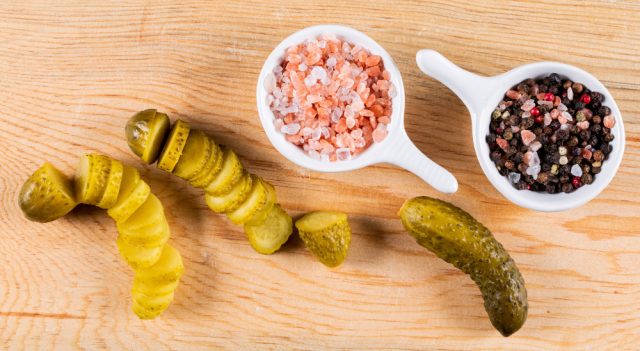Do you find yourself running for the hills whenever someone brings out the pickles? Does the very thought of biting into a pickle make you cringe with fear of an allergic reaction?
Table of Contents
Well, you’re not alone. Pickles are a common trigger for food allergies, and many people struggle with managing their symptoms when exposed to this tangy treat. In this article, we’ll look closer at pickles allergy, their causes and symptoms, and most importantly, how to deal with them like a pro. So, get ready to say goodbye to those pickle-induced panic attacks and hello to newfound confidence in dealing with your pickle allergy.
Pickle-Proofing Your Life: Effective Strategies for Managing Your Pickle Allergy
Living with a pickle allergy can be difficult, especially if you enjoy pickles’ sour and tangy flavors. But don’t worry! You can live a pickle-free life without sacrificing your love of food if you plan ahead of time and take a few simple precautions.
From reading labels and knowing what to avoid to developing coping mechanisms for accidental exposure, this article will cover all the essential steps you need to take to pickle-proof your life. So, whether you’re a long-time sufferer of pickle allergies or have recently developed the condition, read on for some invaluable tips on how to manage your pickle allergy effectively.
Identifying and Understanding Pickle Allergy Symptoms
To oversee your pickle allergy effectively, it’s crucial to be able to identify the symptoms of an allergic reaction accurately. Allergy symptoms can vary from person to person and can range from mild to severe. Common symptoms of a pickle allergy include hives, itching, swelling, abdominal pain, diarrhea, and in severe cases, anaphylaxis.
Anaphylaxis is a potentially fatal allergic reaction that can cause breathing difficulties, a drop in blood pressure, and loss of consciousness. Seek medical attention right away if you experience any of these symptoms after eating or coming into contact with pickles.
It’s also worth noting that symptoms may not appear immediately after pickle exposure and may take several hours to develop, so it’s critical to stay vigilant and monitor your body’s reaction after consuming foods containing pickles.
Exploring Pickle Alternatives: Enjoying Similar Benefits Without the Allergy Risk
If you’re allergic to pickles, you might indeed witness that you’re missing out on the many health benefits that come with eating this tangy snack. Pickles are a good source of probiotics, which help promote a healthy gut microbiome, and they’re also low in calories and high in vitamins and minerals. However, there are still plenty of ways to reap these benefits without putting yourself at risk of an allergic reaction.
To get a similar dose of probiotics, consider adding fermented foods like sauerkraut, kimchi, or kefir to your diet. To get the same crunch and texture as pickles, add fresh fruits and vegetables like cucumbers, carrots, and radishes to your meals. You can find alternatives that work for you and keep your taste buds happy without risking an allergic reaction with a little creativity and experimentation.
Shielding Yourself from Pickle Allergy: Tips for Prevention and Management
Pickle allergy symptoms can be difficult to avoid, but there are several things you can do to protect yourself. To begin, always carefully read food labels to check for the presence of pickles or pickle juice. Avoid foods containing pickles or that have come into contact with pickle juice, such as pickle-flavored chips and some condiments like relish.
Be aware of cross-contamination, such as using the same utensils or cutting boards for pickles and other foods, and be sure to wash your hands thoroughly after handling pickles. In case of accidental exposure, it’s essential to have an allergy action plan and carry your medication, such as antihistamines or epinephrine, as prescribed by your doctor.
Make sure your friends and family know about your allergy and understand the importance of avoiding pickles when cooking for you. With the right precautions and a bit of planning, you can manage your pickle allergy and continue to enjoy all your favorite foods.
Allergic Reaction to Pickles: What to Do in Case of Accidental Exposure
Accidental exposure to pickles can be frightening, especially if you have a known allergy. If you suspect you have ingested pickles or have come into contact with them and are experiencing symptoms such as hives, itching, or swelling, seek medical attention immediately.
In some cases, a severe allergic reaction called anaphylaxis can occur, which can cause breathing difficulties, a drop in blood pressure, and loss of consciousness. If you have been prescribed an epinephrine auto-injector, use it immediately and seek emergency medical help.
It’s also important to stay calm and try to avoid panic, as stress and anxiety can exacerbate symptoms. Always carry your prescribed medications with you and make sure your friends and family know about your allergy and how to respond in case of an emergency.
FAQs
Can you be allergic to pickles?
Yes, it’s possible to be allergic to pickles. Pickle allergies are rare but could indeed arise in symptoms such as hives, itching, swelling, abdominal pain, diarrhea, and anaphylaxis.
Is drinking pickle juice good for gout?
Drinking pickle juice may facilitate soothing gout symptoms due to its high vinegar content, which can help lower uric acid concentration in the body. Furthermore, more research is needed.
Is pickle allergy a common food allergy?
No, pickle allergy is a rare food allergy. While pickle allergies are possible, they are considered uncommon.
Are pickles inflammatory?
No, pickles are not inflammatory. In fact, they may have anti-inflammatory effects attributable to their high vinegar content and potential probiotic properties.
Living with a pickle allergy can be challenging, but with the right information and precautions, you can manage your allergy and continue to enjoy a healthy and varied diet. Whether you’re finding alternative sources of probiotics, avoiding cross-contamination, or seeking emergency care in case of accidental exposure, taking proactive steps to protect yourself can make all the difference. By staying informed and prepared, you can take control of your pickle allergy and live life to the fullest.




